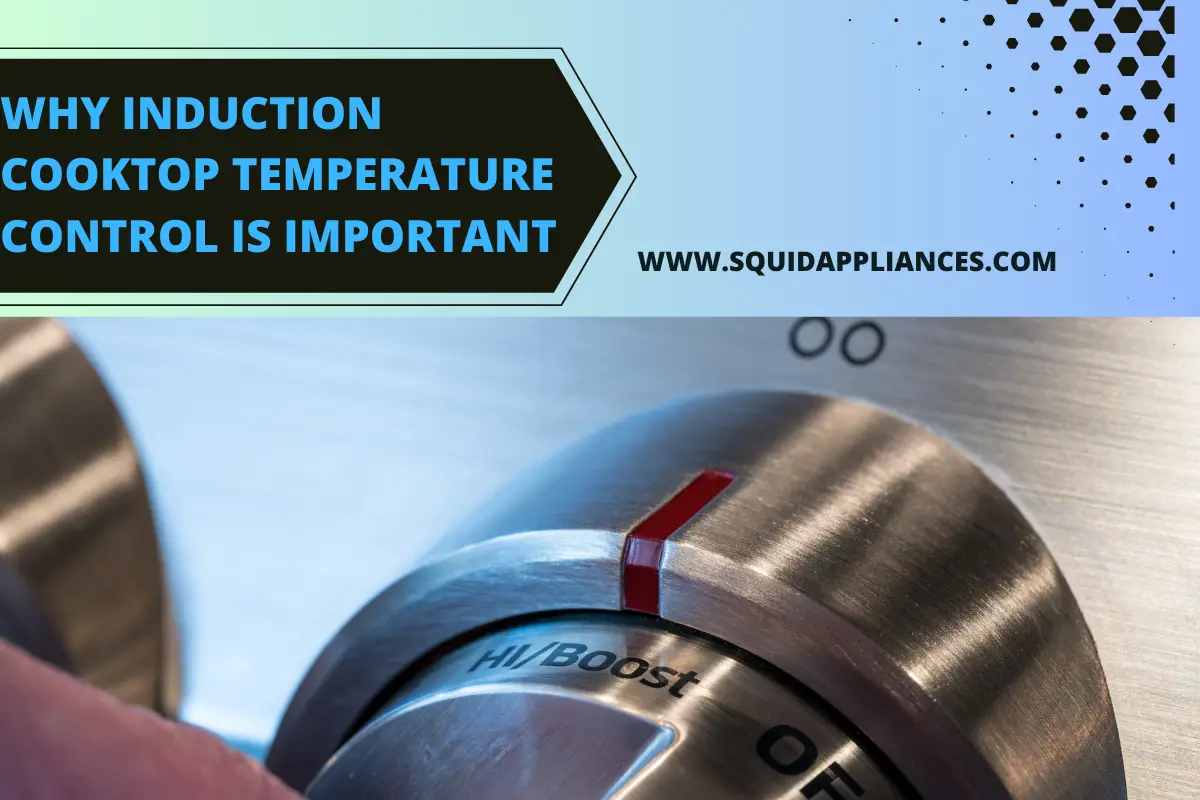‘Too many cooks spoil the broth,’ so they say. But when it comes to induction cooking, I’d argue that it’s not about how many hands are in the pot but rather how well you control the temperature.
Induction cooktops have revolutionized our kitchens with their efficiency and safety features. However, mastering the art of temperature control on these devices is key to truly unlocking their potential.
This guide will dive into why maintaining a precise heat level matters so much in induction cooking and provide practical steps on how to do just that.
So let’s turn up the heat (just right) on your kitchen skills!
Why Is Induction Cooktop Temperature Control Important and How To Do It?
Yes, induction cooktop temperature control is crucial. Induction technology offers faster heating times, energy efficiency, and superior control. Precise temperature control preserves nutritional value and ensures even cooking for perfect texture. To master it, understand your unit’s settings, use safety measures, and practice consistently.
Key Takeaways
- Induction cooktops revolutionize kitchens with efficiency and safety features.
- Temperature control is crucial for unlocking the potential of induction cooking.
- Advantages of induction cooking include faster heating times, energy efficiency, and superior temperature control.
- Induction technology uses magnetic fields to heat pots directly.
Understanding Induction Cooking
You’ve probably wondered what the big deal is with induction cooking, and we’re here to shed some light on this futuristic kitchen technology that’s revolutionizing how we cook.
At its core, induction technology basics involve using magnetic fields to heat pots directly, offering precision unmatched by traditional methods.
The advantages of induction are numerous: faster heating times, energy efficiency, and superior temperature control.
Importance of Temperature Control in Induction Cooking
In my experience with induction cooking, one element that stands out is the importance of temperature control. It’s not just about getting your meal cooked; it’s also about retaining the nutritional value of your food, ensuring even and thorough cooking, and achieving the perfect texture.
Understanding and mastering this aspect can significantly enhance your culinary prowess, making each dish a delightful gastronomic experience.
Preserving the Value of Food
Isn’t it ironic that the very methods we use to cook our food can sometimes rob them of their nutritional value?
Well, with induction cooktops and proper temperature control, we’re able to preserve those precious vitamins and minerals.
The key is nutrient retention; using the right cooking techniques allows us to keep more of what’s good in our food, making every meal not just delicious but healthier too.
Ensuring Even Cooking and Perfect Texture
Mastering the art of even cooking can transform your dishes from good to great, providing that perfect bite every time.
Induction cooktop’s accurate temperature control is key for this. It helps me adapt recipes and apply different cooking techniques effectively.
Whether I’m searing meat or simmering sauces, precise control ensures each dish achieves its ideal texture and flavor.
So remember, with induction cooktops, you’re not just heating food; you’re controlling culinary outcomes!
How to Control the Temperature on an Induction Cooktop
Controlling the temperature on your induction cooktop might seem a bit tricky at first, but with a little practice, you’ll get the hang of it in no time. Start by understanding your unit’s settings and use safety measures when adjusting temperature levels.
This not only ensures energy efficiency but also prevents overheating. Remember, mastery comes from consistent practice so don’t give up too soon!
Tips for Mastering Temperature Control
Just like a seasoned conductor leading an orchestra, you’ll need to learn how to harmoniously balance the heat levels on your stove for that perfect culinary symphony.
Mastering temperature control isn’t just about taste, it’s also crucial for safety measures and energy efficiency.
Keep a close eye on your cookware, adjust heat settings as needed and always remember low and slow is the key to preventing overcooking or burning.
Troubleshooting Common Induction Cooking Issues
Navigating through the common hiccups of using your magnetic-based stove can be a breeze once you know the right fixes. Here are some troubleshooting tips:
- Induction safety precautions: Always ensure your cookware is compatible and positioned correctly.
- Cookware compatibility issues: Not all pots and pans work with induction. Choose ones made from magnetic materials.
- Power problems: If the cooktop doesn’t turn on, check for power supply issues.
Frequently Asked Questions
What is the average lifespan of an induction cooktop?
On average, with diligent Induction Cooktop Maintenance, they can last up to 10 years. Remember though, Cooktop Replacement Costs can be steep, so it’s beneficial to take good care of your appliances.
Can induction cooktops cause interference with other electronic devices?
Yes, induction cooktops can cause interference with some electronic devices. However, using interference solutions and checking device compatibility beforehand can help mitigate these issues, ensuring a smooth cooking experience.
How does the energy efficiency of induction cooktops compare to traditional gas or electric stoves?
In the induction efficiency comparison, induction cooktops are more energy efficient than traditional stoves. My traditional stove analysis shows that they lose heat to the surrounding air, while induction directly heats cookware.
Are there any specific cookware materials to avoid using on an induction cooktop?
Yes, cookware compatibility is key with induction cooktops. You should avoid using copper, glass, and aluminum pots. Induction specific utensils, made of magnetic materials like cast iron or stainless steel, work best.
Is it safe to leave an induction cooktop unattended while it’s on?
While induction cooktops have safety precautions, it’s not recommended to leave them unattended while on. Unattended cooking can lead to accidents or overheating. Always monitor your cooktop for a safe and worry-free cooking experience.
Conclusion
In the dance of culinary artistry, mastering temperature control on your induction cooktop is like perfecting your footwork. It’s a game changer.
I’ve walked you through the steps – understanding its importance, how to do it, and troubleshooting common issues.
Now, the kitchen is your stage. With practice and patience, you’ll be conducting a symphony of flavors with ease and precision in no time!






